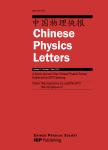Exciton Bose–Einstein Condensation in Transition Metal Dichalcogenide Monolayer under In-Plane Magnetic Fields
作者机构:SKLSMInstitute of SemiconductorsChinese Academy of SciencesBeijing 100083China College of Materials Science and Opto-electronic TechnologyCenter of Materials Science and Optoelectronics EngineeringUniversity of Chinese Academy of SciencesBeijing 100049China School of PhysicsZhejiang UniversityHangzhou 310027China
出 版 物:《Chinese Physics Letters》 (中国物理快报(英文版))
年 卷 期:2024年第41卷第8期
页 面:69-76页
核心收录:
学科分类:07[理学] 070205[理学-凝聚态物理] 0702[理学-物理学]
基 金:supported by the National Natural Science Foundation of China(Grant Nos.92265203 and 11974340) the Strategic Priority Research Program of the Chinese Academy of Sciences(Grant Nos.XDB0460000,XDB28000000,and XDPB22) the Chinese Academy of Sciences(Grant No.QYZDJSSW-SYS001) the National Key R&D Program of China(Grant No.2018YFA0306101)
摘 要:Based on the Gross–Pitaevskii equation,we theoretically investigate exciton Bose–Einstein condensation(BEC)in transition metal dichalcogenide monolayers(TMDC-MLs)under in-plane magnetic *** observe that the in-plane magnetic fields exert a strong influence on the exciton BEC wave functions in TMDC-MLs because of the mixing of the bright and dark exciton states via Zeeman *** leads to the brightening of the dark exciton BEC *** competition between the dipole–dipole interactions caused by the long-range Coulomb interaction and the Zeeman effect induced by the in-plane magnetic fields can effectively regulate dark exciton BEC *** findings emphasize the utility of TMD-MLs as platforms for investigating collective phenomenon involving excited states.



